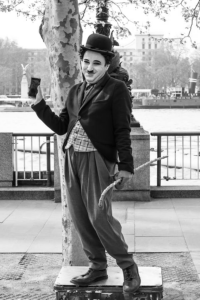Prop masters, or property masters, make sure that actors have the right props when they need them while staying within budget. Prop masters usually work in offices for production companies or freelance for multiple organization and report to production designers, managers, and directors.
What Do Prop Masters Do?
Property masters have a variety of tasks throughout the production process. Their general duties include:
- Obtaining or overseeing the manufacture of props reflecting a production’s style and setting
- Caring for and maintaining an inventory of props
- Ensuring props are available on time and on budget
- Overseeing property department staff to make sure they complete high-quality work
What Are the Responsibilities and Duties of the Prop Master?
Prop masters are responsible for a production’s props before, during, and immediately after filming. According to prop master Elisa Malona, these professionals work with objects that actors interact with rather than static items, which are considered scenery rather than props.
Prop masters typically start working five weeks before a production’s principal photography starts. This position can be stressful but extremely rewarding, and they need to be able to handle a lot of different responsibilities if they want to be a great prop master.
Primary and Secondary Roles During the Pre-Rehearsal Process (Pre-Production Breakdown)
Work for a prop master begins long before a production’s rehearsals start. Responsibilities during the pre-rehearsal period include:
- Evaluating the script and its prop requirements with production designers and art directors
- Attending production meetings to discuss prop needs
- Researching props to ensure production’s props are realistic and appropriate
- Creating props list with prop tables for use during production
- Selecting which items from the props list to buy, hire, and create
- Creating budgets for prop purchase, hire, and creation
Primary and Secondary Roles During the Rehearsal/Build Process
A prop master’s vision starts taking shape when they begin building props. Typical responsibilities for prop masters during this time include:
- Liaising with prop makers and artisans who are creating props for the production
- Designing and adapting props
- Monitoring prop budgets
Primary and Secondary Roles During the Pre-Technical Rehearsal Process
There is more work required before a production’s technical rehearsals begin. Here are some of a prop master’s responsibilities during pre-technical rehearsals:
- Assessing and deciding prop locations
- Ensuring production buyers and props storemen record their prop purchases and hire suppliers
- Ensuring actors can access relevant props
Primary and Secondary Roles During the Technical/Dress/Preview Rehearsal Process
Once technical rehearsals begin, prop masters start working with people who will use props during production. Their responsibilities during this period include:
- Teaching actors how to safely handle and care for props
- Attending rehearsals to monitor prop use and placement and any relevant production changes
- Organizing and storing props until required
- Discussing prop loading, transport, and storage with props storemen
Primary and Secondary Roles for Managing Props During the Run of Production Process
During production, a prop master’s extensive preparation comes to fruition. Their work continues throughout the run of the production with the following responsibilities:
- Ensuring props and standby props are in place for actors
- Monitoring prop continuity between takes
- Caring for animal actors, if production doesn’t have an animal vendor
- Styling food, if production doesn’t have a food stylist
- Working with team members to meet production schedule deadlines
Primary and Secondary Roles During the Strike Process
The strike process is the part of post-production where crews strike, or dismantle, the set. A prop master is active during this process with the following responsibilities:
- Overseeing prop return to hiring companies
- Organizing the sale, storage, or disposal of owned props
What Skills Do Prop Masters Need?
Prop masters rely on a variety of skills to succeed in their roles. Some of these are innate skills, while they may learn others in school and through on-the-job experience. Some of the skills prop masters require include:
- Leadership skills: The ability to manage and motivate others helps prop masters get the most from the people they work with.
- Ability to cope with pressure: This skill helps prop masters manage their team, work in a fast-paced production environment, and meet deadlines.
- Flexibility: Prop masters must be flexible to adapt to production changes and varied schedules.
- Organizational skills: Prop masters should be practical, good at planning and managing time, and able to organize a variety of props.
- Creativity: This skill helps prop masters source props on a budget that will make a visual impact.
- Strong communication skills: Prop masters rely on their written and oral communication skills when liaising when production staff, suppliers, and manufacturers.
- Problem-solving: Prop masters use their problem-solving skills to create and source props that may be difficult to find on a budget.
- Financial skills: These professionals rely on their financial skills when creating and managing budgets.
- Negotiation skills: Strong negotiation skills help prop masters secure props from suppliers and manufacturers for the best price.
- Crafting skills: Prop masters may need crafting skills to create and repair props during production.
- Research skills: Doing plenty of research is essential for learning which props are appropriate for a production’s setting and how to use props safely.
- Industry knowledge: Prop masters must understand health and safety guidelines and relevant work procedures.
What Qualifications, Education, and Experience Do I Need to Become a Prop Master?
Working as a prop master is not an entry-level role. While they don’t need specific qualifications, earning a fine art, design, or film degree can help prop masters secure work. Prop masters should also gain firearm certification. This training helps them safely work with guns and other weapons and allows them to teach their skills to actors and stunt people. They also need a full driver’s license to transport props from suppliers to rehearsal spaces and sets.
After graduation, prop masters typically work in a props department for several years. The following are common entry-level roles for aspiring prop masters:
- Standby props
- Dressing props
- Props storeman
- Assistant prop master
Working on a range of different projects in various genres helps prop masters advance in their careers.
What To Expect
Working as a prop master is an exciting challenge, as every project and production can differ dramatically. The skills prop masters use can transfer to other industry roles, as well, including makeup, special effects, and set decoration.
Working Conditions
Prop masters usually work full-time hours while they’re engaged in production. However, their schedules may change depending on the production’s needs. They may also have periods of time between productions when they do not have to work.
Prop masters spend most of their time in offices with access to a desk with a computer, internet, and a phone. They also work in scene and costume shops, rehearsal spaces, and on set. According to prop professional Joanna Tillman, you need to be a savvy shopper to be a prop master, so the job often involves long hours browsing the internet for the right props.
Physical Requirements
Working as a prop master can be physically demanding. Prop masters need excellent mobility for carrying large props, crawling into tight spaces, and climbing ladders and stairs. They should be able to lift 50 pounds on their own, or between 100 and 200 pounds with others. They should also have good eyesight to distinguish colors, patterns, and textures.
With the right skills and experience, you can enjoy a rewarding career as a prop master.
You can learn more about film and how you can improve your skills by applying to the Nashville Film Institute here.










